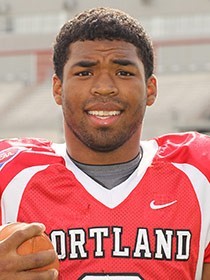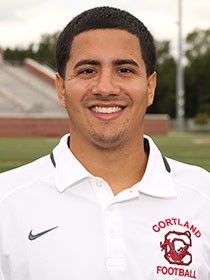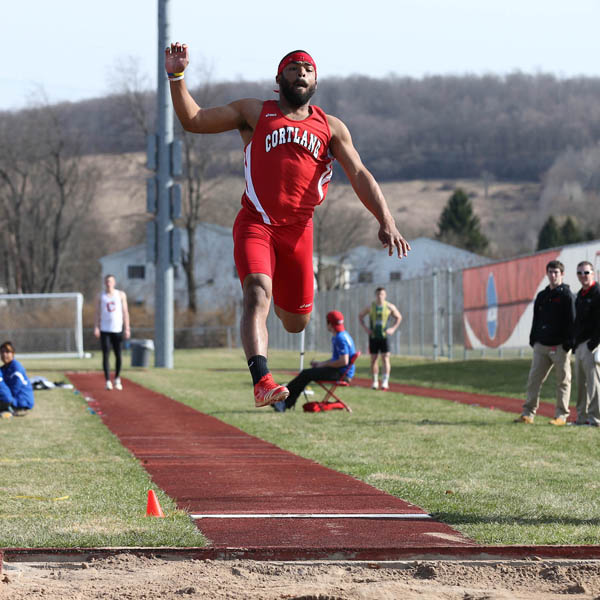News Detail
09/25/2014

SUNY Cortland’s football team may have started the 2014 season with two narrow non-conference losses, but the squad also has posted a pair of monumental wins in the form of two successful bone marrow donation matches.
Senior Andre Green, a former defensive standout, donated his blood stem cells for a transplant Sept. 10 at Upstate University Hospital in Syracuse. In July, assistant coach Nate Pagan underwent surgery to harvest his cells at Hahnemann University Hospital in Philadelphia.
The pair became the latest success stories for the football team’s bone marrow registry efforts, joining a handful of other former players and friends of the program who were matched and opted to step up. The heroes include John Stephens ’14, whose donation saved the life of Clara Boyle, a California infant struggling against leukemia.
Pagan’s donation will help a young man fighting Hodgkin’s lymphoma. Green’s effort was made on behalf of an 8-year-old girl who needed healthy blood cells.
Each spring since 2009, the SUNY Cortland football team has participated in the “Get in the Game, Save a Life” National Marrow Donor Program (NMDP) Drive by hosting a registration event on campus.
 |
| Andre Green |
Becoming a member of the registry is easy and pain-free; volunteers simply swab the inside of a person’s cheek for 30 seconds. But while there are millions of registered marrow donors worldwide, only one in every 540 members of the NMDP registry will go on to donate bone marrow or blood stem cells to a patient.
SUNY Cortland’s football team has contributed six potential matches in the five years it has organized a donor registration drive.
“It’s such a euphoric feeling — what we’re involved with,” said head coach Dan McNeill ’79. “It immediately gives someone hope for a life saved.”
Pagan’s donation was a long time coming — the wide receivers coach had his mouth swabbed four years ago during his football playing days at West Chester University in Pennsylvania. This past summer, he made several trips for blood work and rearranged vacation plans to donate.
“It’s a powerful experience and somewhat stressful at the same time,” the 24-year-old said. “You don’t think you’re going to be a match and then you get that phone call.
“It’s like, ‘This is it.’”
Green’s donation helped him cope with a personal loss.
 |
| Nate Pagan |
The Philadelphia, N.Y., native transferred to SUNY Cortland in the spring of 2012 with two years of sports competition in his sights. He contributed immediately to the College’s football and track and field teams, earning second team All-NJAC honors and leading the team in tackles on the gridiron in 2012, and finishing 12th nationally in the long jump at the 2013 NCAA Div. III Men’s Outdoor Track and Field Championships.
“He just is a special athlete,” McNeill said. “He’s just one of those young men who caught everybody’s eye.”
The 2013 football season started similarly, with Green spearheading the team’s defense and again leading the team in tackles. He finished with a career-high 14 tackles and a fumble recovery in the team’s fourth game — his finest performance in a Red Dragon uniform.
His best game, however, also was his last.
Throughout high school, Green dealt with “stingers,” or nerve pinch injuries common in contact sports that cause stinging arm pain along with weakness or numbness. Following his career-best game at Cortland last year, Green lost feeling in the right side of his body on and off for a week and a half. He figured it was another stinger and that he’d be back soon enough.
“I felt perfectly fine otherwise,” he said. “That was the hardest part — knowing that I felt fine but not being able to play.”
A visit to a specialist at Upstate University Hospital confirmed it wasn’t that simple. Two pinches in Green’s spinal cord were detected. He still could compete in track and field; contact sports such as football were out of the question.
“It was heartbreaking,” he said.
Even after the career-ending injury, his greatest contribution to the College’s football program had yet to be made.
Green received a phone call in May, after participating in the team’s bone marrow registry drive for the second time, identifying him as a potential match. In late July, he was matched officially.
“When I found out I was a possible match, it was like: ‘OK, this is only a possibility. I still have to do blood work and everything like that.’
“Then when I got the second phone call, I was a little nervous obviously, but there was no hesitance. There was no question. I was really excited.”
Due to his injury, Green participated in a peripheral blood stem cell (PBSC) donation, which differs from the procedure that surgically draws liquid marrow from the pelvic bone. The non-surgical process removes blood through a needle on one arm and passes it through a machine that separates out blood stem cells, before returning the remaining blood to the donor through the other arm.
Green said he was achy after the procedure and spent a few days recuperating in his hometown. His focus athletically will turn to track and field, where he’ll work to return to the national championships in 2015. He’s slated to graduate in May with a degree in criminology then hopes to pursue a career in social work with children.
 |
| Green hopes to return to the national championships in indoor and outdoor track and field in 2015. |
Very few personal details are shared between bone marrow donors and their recipients early on. Both parties must offer their consent to exchange contact information and even that part of the process can take several years. Green knows only that a young girl with anemia needed his blood-forming cells.
His long-term goal is to meet the recipient with a clean bill of health.
“We’re certainly blessed to be part of such a special program,” McNeill said. “Certainly, a lot of Dragon blood flows through some veins out there and has saved some lives.
“It doesn’t get any better than that.”

